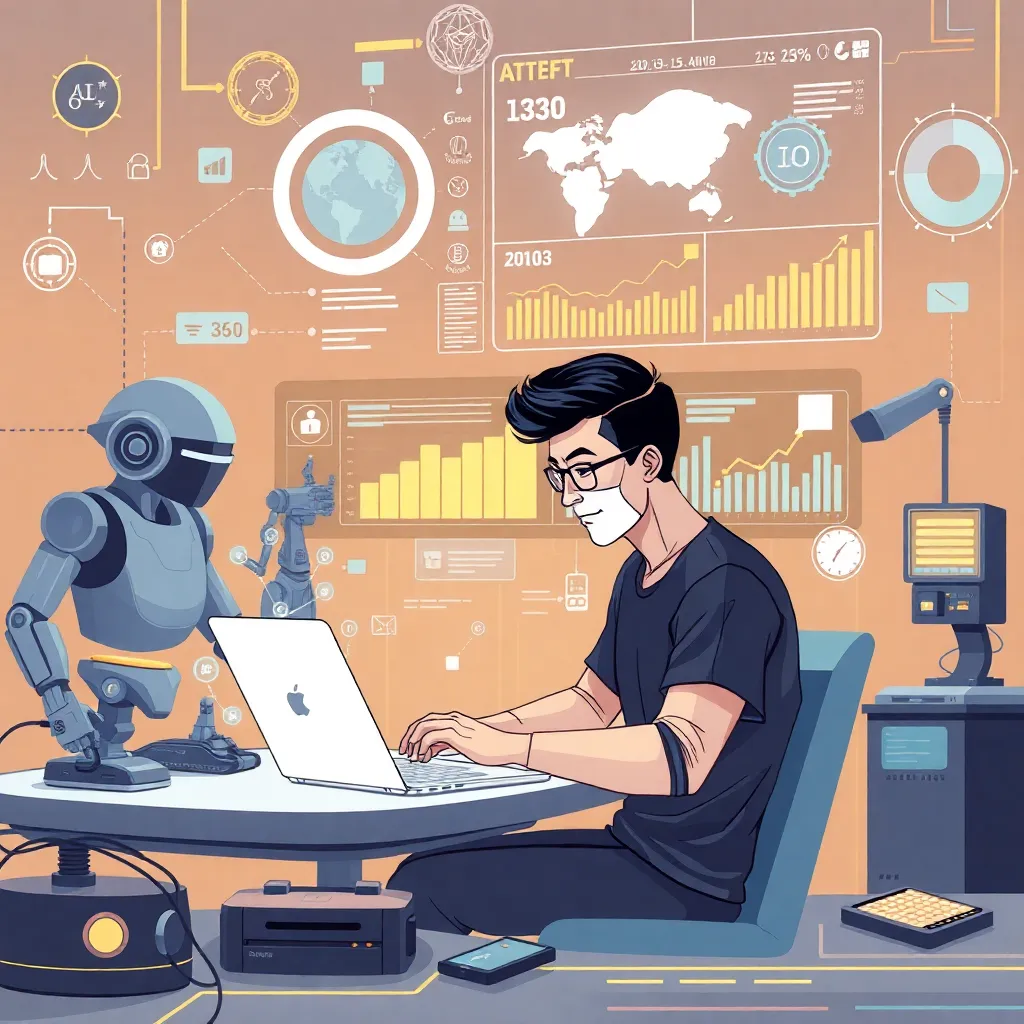AI-Powered Entrepreneurship Education for the Future

The rapid evolution of the entrepreneurial landscape demands a new breed of business leaders who can harness the power of artificial intelligence, machine learning, and data analytics to drive innovation and growth. As AI continues to transform industries and revolutionize the way businesses operate, it's essential that entrepreneurs possess the skills and knowledge to leverage these technologies effectively.
Traditional entrepreneurship education often focuses on developing skills such as marketing, finance, and strategy, but AI-powered entrepreneurship education takes a more holistic approach. By integrating AI, machine learning, and data analytics into the curriculum, educators can equip students with the ability to analyze complex data sets, identify patterns, and make data-driven decisions.
This shift in focus is critical, as AI is no longer a niche technology but a mainstream driver of business success. According to a report by Gartner, by 2025, AI is expected to create new job opportunities, but it will also replace certain tasks, making it essential for entrepreneurs to be AI-literate.
By embracing AI-powered entrepreneurship education, business leaders can stay ahead of the curve, drive innovation, and create sustainable competitive advantages. As the business landscape continues to evolve, it's clear that AI will play an increasingly important role in shaping the future of entrepreneurship and innovation.
The Rise of AI-Driven Entrepreneurship
The integration of AI in businesses has revolutionized the way they operate, leading to increased efficiency and productivity. By automating mundane tasks, entrepreneurs can focus on high-value tasks that drive innovation and growth. Moreover, AI has enabled businesses to uncover new revenue streams, creating opportunities for entrepreneurs to tap into new markets and customer segments.
However, to fully leverage the potential of AI, entrepreneurs need to possess the necessary skills and knowledge. This is where AI-powered entrepreneurship education comes into play. By providing students with a comprehensive understanding of AI and its applications, these programs empower entrepreneurs to develop and implement AI-driven solutions that address real-world problems.
According to a report by PwC, AI has the potential to contribute up to $15.7 trillion to the global economy by 2030. With AI-powered entrepreneurship education, entrepreneurs can tap into this potential, driving growth and innovation in their respective industries.
By combining technical skills with entrepreneurial mindset, AI-powered entrepreneurship education prepares students to navigate the complexities of AI adoption and implementation. As AI continues to transform the business landscape, entrepreneurs who possess the skills to harness its power will be well-positioned to succeed in an increasingly competitive market.

Personalized Learning Experiences
AI-powered education platforms can offer personalized learning experiences tailored to individual students' needs and learning styles. This approach enables students to learn at their own pace, focus on areas where they need improvement, and develop a deeper understanding of complex concepts.
By leveraging AI-driven analytics, these platforms can identify knowledge gaps and adapt the curriculum to meet each student's unique requirements. This personalized approach has been shown to improve learning outcomes, increase student engagement, and reduce the achievement gap (US Department of Education). Moreover, AI-powered platforms can provide real-time feedback and assessment, enabling teachers to track student progress and make data-driven instructional decisions.
Furthermore, AI-powered education platforms can facilitate more effective teacher-student interactions. By automating routine tasks such as grading and lesson planning, teachers can focus on providing individualized support and guidance to students. This, in turn, can lead to stronger teacher-student relationships and a more supportive learning environment.
Virtual Mentorship and Networking
One of the significant advantages of AI-powered entrepreneurship education is its ability to facilitate virtual mentorship and networking opportunities. Through online platforms, students can connect with experienced entrepreneurs, investors, and industry experts from diverse backgrounds and locations, gaining access to a wealth of knowledge and experience.
This exposure can be instrumental in helping students develop valuable connections that can aid them in their entrepreneurial journey. According to a report by Kauffman Foundation, entrepreneurs who have mentors are more likely to experience business growth and survival. Moreover, these connections can provide students with insights into different markets and industries, enabling them to refine their business ideas and create more effective strategies.
The virtual nature of these mentorship and networking opportunities also means that students can connect with experts from around the world, transcending geographical boundaries. This can be particularly beneficial for students who may not have access to such resources in their local communities. By leveraging AI-powered platforms, students can tap into a global network of entrepreneurs and industry experts, gaining a more comprehensive understanding of the business world.
Ultimately, the virtual mentorship and networking opportunities provided by AI-powered entrepreneurship education can help students develop the skills, knowledge, and connections needed to succeed in today's fast-paced business environment. By providing access to a global network of experts and entrepreneurs, these platforms can empower students to turn their business ideas into reality.

Real-World Applications and Case Studies
By focusing on real-world applications and case studies, AI-powered entrepreneurship education can bridge the gap between theoretical knowledge and practical skills. This approach allows students to explore the tangible implications of AI and related technologies on businesses and industries, rather than just learning about abstract concepts. For instance, studying the implementation of AI-powered chatbots in customer service can help students understand how to leverage technology to improve customer experience and reduce operational costs.
Moreover, real-world case studies can provide students with a nuanced understanding of the challenges and opportunities presented by AI. By examining successful startups and established companies that have integrated AI into their operations, students can gain insights into the strategic decisions, technical considerations, and ethical implications involved in AI adoption. This can help them develop a more informed perspective on the role of AI in entrepreneurship and make more effective decisions in their own ventures.
This practical, application-focused approach can also foster a sense of innovation and experimentation among students. By working on projects that involve developing AI-powered solutions to real-world problems, students can cultivate their creative problem-solving skills, critical thinking, and collaboration. According to a report by the World Economic Forum, these skills are essential for success in the Fourth Industrial Revolution, where AI and automation are transforming the nature of work and entrepreneurship.
Conclusion: Empowering the Next Generation of Entrepreneurs
Indeed, AI-powered entrepreneurship education has the potential to transform the business landscape by equipping students with the skills to leverage AI in innovative ways. This could lead to the creation of new industries, business models, and opportunities that we cannot yet imagine. According to a report by PwC, AI has the potential to contribute up to $15.7 trillion to the global economy by 2030, making it a critical component of future business success.
By integrating AI into entrepreneurship education, we can foster a new generation of entrepreneurs who are capable of harnessing the power of AI to drive growth, improve efficiency, and solve complex problems. This could lead to the creation of new startups, jobs, and opportunities that can have a profound impact on local and global economies. Moreover, AI-powered entrepreneurship education can also help address some of the world's most pressing challenges, such as climate change, healthcare, and education.
Furthermore, AI-powered entrepreneurship education can also democratize access to business opportunities, enabling entrepreneurs from diverse backgrounds to participate in the global economy. By providing students with the skills and knowledge to develop AI-powered solutions, we can create a more inclusive and equitable business environment that benefits everyone. As UNESCO notes, education is key to unlocking the potential of AI and ensuring that its benefits are shared by all.